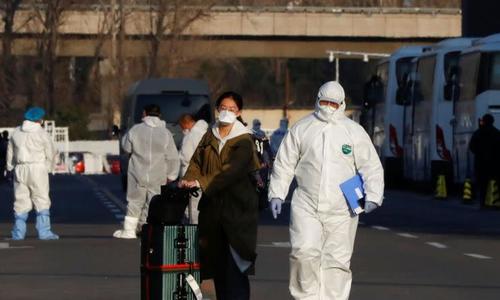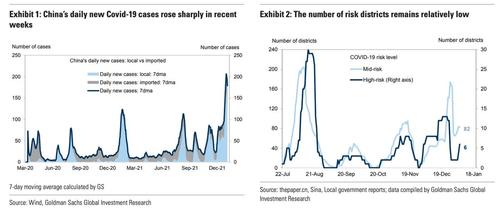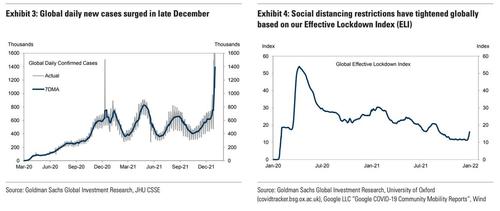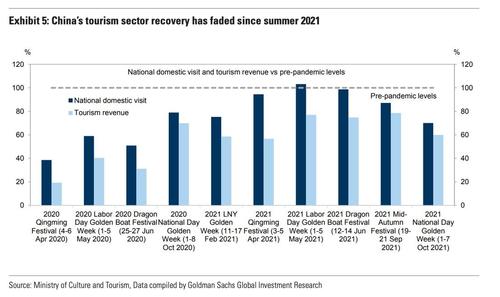Beijing Expected To Keep ‘Zero COVID’ Policy For At Least Another Year
With China facing the prospect of an omicron-driven wave of COVID cases that’s worse than anything the country has seen since it first unleashed SARS-CoV-2 upon the world, analysts on Wall Street are trying to suss out exactly what all this could mean for China’s economy, and by extension, the world.
It’s clear that an outbreak carries economic costs. Spending on COVID prevention measures could crowd out spending on manufacturing and infrastructure.
Taking into consideration the economic risks and political considerations, a team of analysts at Goldman Sachs expects Beijing to maintain its zero-COVID policy – or ZCP – through late 2022 at the very least. So far, China’s outbreaks have been concentrated in a small number of provinces, as the charts below reflect.
Now, Goldman’s team acknowledges that the advent of the omicron variant has already prompted its economists to lower their expectations for global growth. And it’s not only China that’s imposing more restrictions on both travel and its domestic economy. The Netherlands and South Korea are just two examples of countries that have adopted lockdowns to try and stop the spread of omicron.
As far as China’s policymakers are concerned, the Zero COVID Policy has a few major benefits, and a few major costs. The benefits are as follows: 1) domestic containment of COVID — few new cases, hospitalizations or deaths, with social order under control; 2) less squeeze on domestic healthcare resources, and 3) a favorable environment for manufacturing production and goods exports.
It also carries clear economic costs, including: 1) constant disruptions to the recovery of close-contact services sectors; 2) weakening the multiplier effect of fiscal expenditure as spending on some COVID prevention measures may crowd out some infrastructure spending, with the former usually less effective than the latter in boosting private consumption and investment, 3) relative isolation from the rest of the world due to substantially less cross-border passenger flows for economic and cultural cooperation.
Taking all this into consideration, the Goldman team expects Beijing to maintain its ZCP through at least late 2022 – so the better part of a year.
But already, China’s tourism industry is already struggling from the ZCP.
The Goldman team has sketched a rough analysis of what’s to be expected should their base case come true. They have also worked up a “downside” and a “severe downside” scenario as the bank tries to keep ahead of the worst-case scenario.
- Baseline: The current approach is still effective in containing small occasional Omicron outbreaks in only a few cities. In this case, our ELI stays at 10 in Q1, followed by a gradual decline towards year-end.
- Downside: Omicron cases spread to multiple provinces, the same as the wave in August 2021, with the epicenter in a densely-populated coastal province Jiangsu. In this case, we assume our ELI increases to an average of 20 in Q1, similar to its level in August 2021, before moderating to around 5 in Q4 this year.
- Severe downside: Community transmission of Omicron cases happens in most provinces, leading to a national lockdown in Q1 (comparable to the initial Covid-19 outbreak across the country during February-March 2020). Given the high transmissibility of the Omicron variant, some social distancing measures may remain in place until the end of 2022. In this case, our ELI increases sharply to a peak of 80 in January before normalizing gradually to around 10 in late 2022.
Bottom line: Goldman expects scattered outbreaks to shave 0.9% of GDP growth off during the coming year as Beijing stands by its “Zero COVID” policy.
The worst case scenario would see 3.3% taken off the country’s growth forecast.
Not that it matters much, but popular opinion is already growing weary of the latest lockdowns. Is there any chance that the CCP listens to its people and decides that ZCP simply isn’t sustainable?
Tyler Durden
Thu, 01/06/2022 – 10:49
via ZeroHedge News https://ift.tt/3JMJZc0 Tyler Durden




